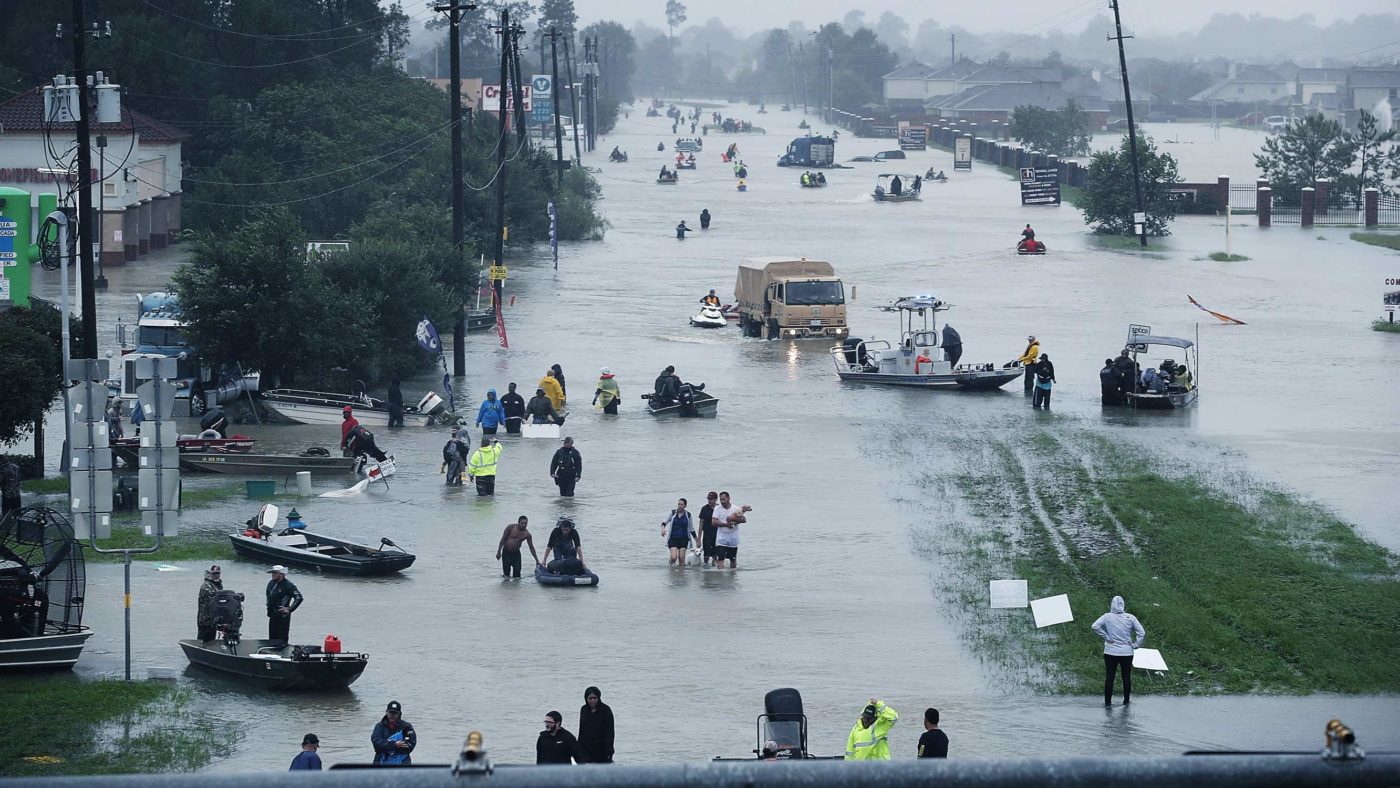Let’s start with the obvious. Tropical Storm Harvey is currently causing horrendous suffering in Houston and beyond. Many people are thought to be dead, tens of thousands have been displaced from their homes, and hundreds of thousands are without power.
It is not, in other words, a good thing. So going up to one of those suffering Houstonians and telling them they might actually better off in the long run is a recipe for a – fully deserved – punch in the face.
And yet if events follow the same pattern as with Hurricane Katrina, there may indeed be an unexpected upside – even if it is scant consolation for the death, danger and disruption that the storm has brought with it.
Houston is not New Orleans. It is a much larger and much richer place, with a much more sophisticated economy. One of the reasons the storm has been so damaging, in fact, is that it has knocked out a central node in the world’s largest and arguably most sophisticated economy. The economic harm is therefore expected to be severe and long-lasting, especially because it now appears that much of the city was un- or under-insured.
But one aspect of the flooding pattern is familiar. So far, it appears to be the poorest areas that have suffered most: those homes built on marginal land, of cheaper materials, in communities without the resources to invest in flood defence.
Last year I visited New Orleans to research two pieces – one, about a series of shocking scientific experiments (including an attempt to “cure” homosexuality), and the other about how the city used the opportunity provided by Katrina to build America’s most-improved education system.
What was most striking about the city was the sheer geographical segregation. Parts of it, in the wake of Katrina, had been simply abandoned. Others, including the area where I was staying, still bore the scars. But in richer areas – even those that had been flooded – there was not a blade of grass out of place.
The areas most broken by Katrina, in other words, tended to be those which had been broken already. Obviously, suffering from a natural disaster on that scale had made things an awful lot worse. But New Orleans was already, as was pointed out recently on CapX, a Third (or perhaps Second) World city in a First World country.
As that author noted, if New Orleans were a country it would have the second highest homicide rate in the world. At the time of Hurricane Katrina, 62 per cent of its schools were judged to be failing, with only 35 per cent of pupils reaching the basic required standards – 23 per cent below the average across Louisiana as a whole. And Louisiana is, in turn, one of the worst-performing states in the US.
In my article on education, I pointed out how utterly remarkable the subsequent transformation of the education system had been. New Orleans effectively embraced the same academies and free schools model as the UK, using Katrina as a tabula rasa to replace its malfunctioning educational system with a network of charter schools built around greater choice, greater competition and higher standards.
But it is not only those who stayed in New Orleans, or returned to it, who saw aspects of their life improve after Katrina. Tyler Cowen, whom I interviewed a few months ago, has highlighted some fascinating NBER research into the living standards of the permanently displaced.
By analysing tax returns, researchers found that in 2006, the year after Katrina, average wages of those who were displaced were roughly $2,200 lower than those of people from similar cities who had not had to flee. By 2007, they had made good their losses. And by 2008, they were actually doing better than the controls – in other words, better than they would have if Hurricane Katrina had never happened, and they had stayed in New Orleans.
The point Cowen makes is that this should not actually be a surprise. People are not economically rational actors. When they are living in broken, deprived communities, they often stay there – either because they feel they cannot afford to move, or because they have social, emotional and financial commitments that keep them there.
But as the paper puts it, “when forced by an exogenous shock to migrate, people are able to choose from a wide range of possible locations to move to, and they seem to choose places that offer them better economic opportunities”. Katrina, in other words, acted as the necessary jolt that removed people from these islands of deprivation. And it turned out that proximity to higher-income neighbourhoods – even those only a notch up the income scale – raised people’s own incomes. (Though obviously the aid and support they received also helped, certainly in terms of repairing the initial economic damage.)
This is not an argument that we should not provide for those who are similarly displaced in Houston – or, indeed, that they should welcome their displacement. But it is a reminder that to those who are rebuilding the city that they should not simply park the poorest and most discriminated against back in the same islands of deprivation. And it is a reminder to us all that it should not take a natural disaster to force us to examine this problem.
One of the most noted features of the modern economy, in America and beyond, is increasing segregation: the rich cluster with the rich, and the poor with the poor. That, in turn, limits the opportunities available to the poor – something Cowen has been howling from the rooftops about. This is not a natural disaster: it is a slow-motion, ongoing one. But it is no less damaging for that.


